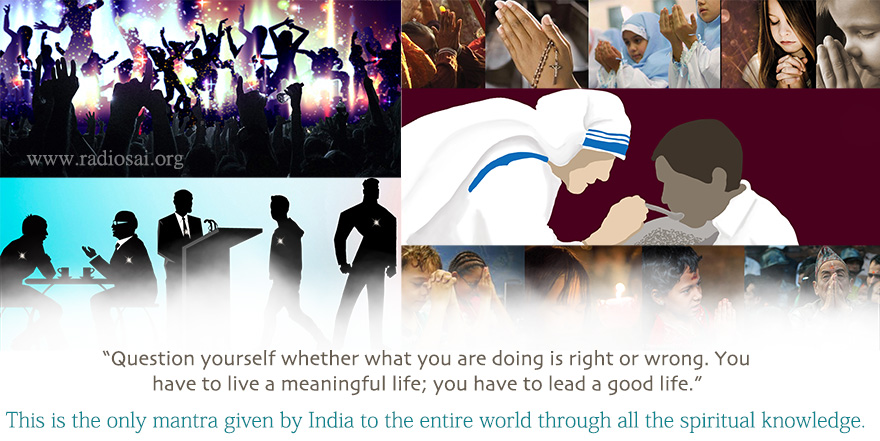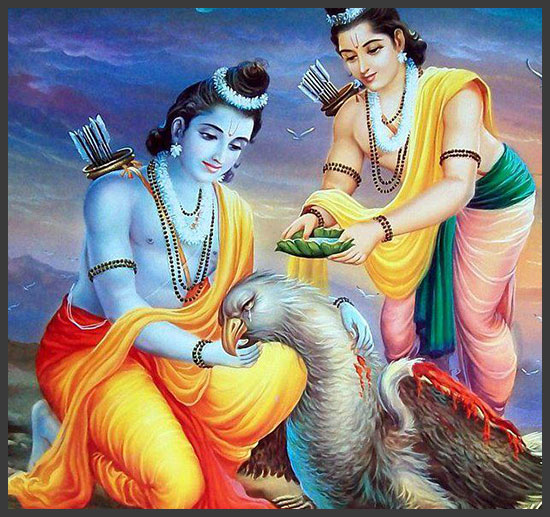|
|
| 'Like' us on Facebook | Follow us: |
Posted on: Sept 11, 2014
Natural Calamities: Who's Responsible?
- A Panel Discussion
part 03
Social Responsibility Should be the Principal Focus of Corporates
DA: We fought ferociously and Swami was very intently looking at us. We finally did not come to a conclusion. We asked Swami, “What is Your final word on the debate?” Swami was very categorical. He said, “Institutions are more responsible because they create the overall environment where the desires of an individual are aroused. The kind of films that movie-makers make today is the kind of films viewers will see and demand.” We talk about the fundamental discrimination that man should have; man should have morals and ethics and self-responsibility. All these are great ideals that humanity has not yet evolved to. For ten years, I was living in the Sri Sathya Sai senior boys' hostel. I would see that many of the boys even at MBA level would come from non-devotee families. They had not heard of Swami and not had His darshan but just came for an MBA degree. But by Bhagawan's grace they are here.
Morning we start Suprabhatam, then we chant Brahmarpanam and then we have breakfast. We then go and play as if we are playing for the team of Bhagawan. Next, we go to college and first pray to Bhagawan. After every class we have a prayer to Bhagawan. We then go for lunch and then go to play. The point is that every activity that a boy or a girl of the University goes through is oriented towards Bhagawan.
The institution has been structured in such a way that even if a non-devotee comes from a family that has heard bad things about Swami, which they are not aware of but the media has been telling, even that student within a week or ten days is an ardent devotee of Swami. How does it happen? It is because the institution has an environment whereby he is automatically moulded.
So I think it is more the responsibility of the institutions not to entice or arouse the greed of people and to instead focus upon their needs. Some people ask if all the institutions or all the organisations focus upon only the needs of people, can they make profits? Of course they can, because every organization must see what the real need of the nation is. They should not go for industries where they get maximum profit. They can go to industries where they can serve society best - where the real needs of people are!
 |
There are many organisations we can talk about - Tatas, Bharat Petroleum, Suzuki, and Hindustan Lever. They've made great profits but have also taken up very good projects that cater to the real need of the nation. It is a corporate responsibility.
But what is happening today in the world, sister, is very unfortunate. We have a system called quarterly earnings reporting and earnings guidance. Every quarter, the CEO's fate depends upon whether the quarterly result is as good as the competitors or not.
KSM: And the stocks fluctuate accordingly.
DA: Yes. Swami says that the profit that an organization earns is only the result of the service it provides to society. But the long-term orientation and the noble vision of corporates is lost in the din of quarterly earnings reporting. That is why they are forced to become myopic in their viewpoint. This causes them to destroy the environment, create scams, fiddle with accounts and do everything that is not correct and immoral, adharmic, and still show higher profits. That is why the role of the institutions, the role of government, and the role of the regulators comes into picture. They must force organisations to create an environment where the long-term view or service-oriented view is given credit and not a short-term profit-earning view.
KSM: So what I am hearing from you is that there is a need for eco-centric leadership. But we are still lacking it. We have some institutions moving in that direction but overall we're still driven more by profit rather than purpose; we don't hesitate to flout a few guidelines or regulations because there are regulations in place. Even in India we have regulations, although I shouldn't be saying even in India with such disbelief. Every country has regulations and they can easily be flouted by means of rampant corruption and special interest groups and lobbying; net outcome is that effluents continue to flow into our rivers; mining and drilling happen uninhibited.
DA: The model on which today's economies is working, as you rightly said, is incorrect. If today we have to develop India and China into Europe and America, we need resources of at least four earths put together. But we have only one planet.
 |
We have only one spaceship, Earth, of which we are all the passengers. If we destroy it, we have nowhere else to go in this whole universe. We have to understand that the parameters of growth and success will have to change in these current realities. We cannot say that GDP is a measure of growth.
Today Bhutan is one example in the whole world. They talk about gross national happiness as an index of growth. Bhutan has made a firm commitment that 70 percent of its land will always be under forest cover. It is not dictated by any world organization. Bhutan has made its own dictate – “We want to live in tune with our own culture, with nature, and with the environment.”
If we all change the parameters by which we judge success, I think the whole world can change into a much better and sustainable place to live in. It will be a joy to live in the world and we will not have such interviews on Radio Sai; instead we'd be talking about how happy we all are and what has resulted in that.
We Need to Re-learn the Secrets of Happy Living
DA: Bhagawan Baba Himself was asking us to do something that would help us in leading a comfortable life. After all, the first point is how long will you go on pushing yourself in the game of making more and more profits? How long and how much? Is there any limit? You are going on playing a game where there is no end at all. Ultimately you succumb, get tired and you vacate. When you get old and look back, there is nothing you really did. That means your existence on this planet has not contributed any good to the planet or to the society. You have lived a life which is a big waste.
KSM: Based on the mantra of ‘I, me and mine’ - which is what plagues modern society.
GS: It is common sense. It doesn't require any explanations from Vedas and Upanishads. Bhagawan Baba said only one thing – “Question yourself whether what you are doing is right or wrong. You have to live a meaningful life; you have to lead a good life.” This is the only mantra given by India to the entire world through all the spiritual knowledge.
 |
Are you leading a good life at all? What is a good life? A good life is one where you keep yourself comfortable with the minimum that is required and lead a happy life. At heart are you really happy or not? You may be a multi-millionaire with lots of problems. What is the use? On the other hand you may be very satisfied, renouncing the entire world and wearing saffron clothes.
In India the ancients wanted everybody to be satisfied with the minimum that is possible so that everybody has what is required. The idea is to keep the entire society happy. That is the reason in India we say that society is first and not the individual. Unfortunately when we get into economics and competitive production, the capitalistic model, society is sacrificed.
We are not bothered about society at all. The individual thinks of himself alone. But in India we never had such thinking at all. It is totally spiritual - every individual will be ready to sacrifice his own personal interest for the welfare of others. The supreme example for this principle is Bhagawan Baba Himself.
Bhagawan Baba said, “I am offering Myself to the service of the entire society and I want everybody to understand me.” That is why always Swami said, “Whatever I am doing, try to do at least to some extent. Whatever you are thinking should be good, your looks should be good, your talk should be good, your thoughts should be good; then you will lead a comfortable, peaceful and happy life.” Even your thoughts can destroy nature.
 |
KSM: Nature is so animate that what I think right now affects nature - if I think a bad thought or if I feed my senses with, for example, some garbage from the media - it is having an immediate effect on my environment.
GS: I was watching a picture today sent by mail. There is a monkey which comes to a small kid in a cradle and it is playing with the kid regularly in his house. What is it that makes an animal come and play every day with a small kid? Sometimes a lion doesn't attack an individual; it just goes back. What is so special about him? Why does it attack somebody and does not attack somebody else? All these things are very common. We see all these things happening every day in the entire world, but we don't get the message. A person who is pure is one with nature and nature is always with him.
Valmiki describes in the Ramayana that when Shri Ramachandra went into exile, the minute Sita was abducted, the whole of nature came to a standstill. For a few seconds even the wind stopped blowing. The leaves of the trees did not flutter and the deer around had stopped grazing. Such a calamity had befallen the entire creation and it was a fantastic example given in the Ramayana. Valmiki Maharshi tells us how we are in tune with nature and how nature is going to respond.
 |
Also when Shri Ramachandra was in search of Sita, monkeys came and helped him. Monkeys are considered to be the most fickle-minded but even they will become most disciplined when on the righteous path. A bird like Jatayu, which knew the power of Ravana, attacked him even if it were a question of sacrificing its life. Valmiki says Jatayu did it because that was the right way of spending its life; its life got sanctified in the process.
KSM: Because he was doing it for the right cause.
GS: He died and it was a wonderful death! In Ramayana they say what a pious death it is! You pray for a wonderful death, not for a wonderful life. In India, we give special meaning to things which are neglected by most of society today.
KSM: And if I may add, Baba has said that Sita represented Prakriti or nature. So when Ravana abducted her, he was violating nature and that is what led to his downfall. Now instead of violating Mother Nature, if he had embraced Dharma, personified by Lord Rama, his life would have been sanctified. And he would have achieved the goal of his life, which is immortality.
But he chose to violate nature and that was the cause of his annihilation.
GS: Swami explained that when Jatayu's wings were cut and it fell, it went on chanting the name of Rama. Shri Ramachandra arrived and pulled the bird holding its head on his thigh. He got some water and put it into its mouth. When the bird died, a pyre was arranged and Rama actually cremated the bird. The last rites for the bird were performed by Shri Ramachandra Himself.
This opportunity was not given even to Dasharatha, His father. His own father did not get it, a bird got it! When Dasharatha died, Rama was not there. You have to read Ramayana and all the scriptures properly and understand the message that your life is meant to be utilized in the service of society; you don't have a separate existence.
- Radio Sai Team
| comments powered by Disqus |
What do you think about this article? Please let us know by writing in to h2h@radiosai.org. Do not forget to mention your name and country.











